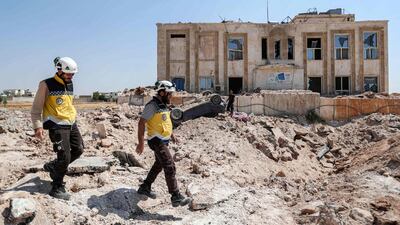Since Russian forces entered Syria four years ago, their presence has been a source of fury for the world's leading powers. Little more than a year after the annexation of Crimea, President Vladimir Putin's decision to again act militarily, ultimately saving Bashar Al Assad's regime, not only changed the course of the conflict but it wrong-footed the West and created a rift on the UN Security Council that lasts to this day; as a permanent member of the council Russia was calling for peace while at the same time engaging in war.
That incongruous stance remains stark in Idlib. Russia's abrupt announcement that Syrian forces would begin a ceasefire in the north-western province on Saturday is being viewed with scepticism by diplomats, including Moscow's own.
“This is not the first ceasefire and I am afraid not the last ceasefire. I hope this one will last but I really have doubts,” Dmitry Polyanskiy, Russia's deputy permanent representative to the UN, said on Friday. His prediction was that the rebels fighting Syrian government forces would not observe the truce.
Beyond the battlefield, Moscow's own image is at stake. A draft resolution circulated among members of the Security Council on Thursday and seen by The National had called for a ceasefire, "expressing outrage at the unacceptable levels of violence escalating in and around Idlib province". Drafted by Belgium, Kuwait and Germany, the next sentence of the document cites "the indiscriminate attacks in densely populated areas, through an intensified campaign of aerial bombings and the use of barrel bombs" and was intended to shame Russian and Syrian forces.
Russia's announcement of the ceasefire came soon afterwards. Regardless, diplomats met in private at the UN on Friday to discuss the proposed resolution moving forward. "We will continue the process on Tuesday," a European official told The National, ensuring that Idlib remains on the council's agenda.
While much was made of last week's meeting between Mr Putin and Turkish President Recep Tayyip Erdogan, the guarantors of a failed de-escalation zone in Idlib, other factors sped the truce. Russia will this week take over the presidency of the Security Council for September and it is eager to avoid public clashes and embarrassment over Syria. After months of censure from the US, Britain and France over its role in Idlib, Moscow is instead more likely to want to show it retains influence over the Assad regime.
Mr Putin's apparent leverage over the Syrian leader has at various times been dangled, unsuccessfully, as a means to bring Damascus to the negotiating table and end the war. But no political process has materialised. Idlib is the latest manifestation of Syrian stalemate. While the regime wants to reclaim the province within months, UN officials believe the fighting could last years.
Locked in conflict since 2011, Mr Al Assad retains a bunker mentality that depends on him winning back territory through military means. A UN-led effort for a peace settlement is stumbling once again. Syrian officials are stonewalling international inspectors over access to sites believed to have been used to produce chlorine gas that could be dropped on civilians. Efforts to release prisoners are also deadlocked. While fighting rages the desire of western powers that Mr Al Assad will eventually step aside under a new constitution, elections and a political reconciliation process has never seemed so fanciful.
Depending on whose body count is to be believed – foreign-based monitors or humanitarian groups in Syria – between 500 and 1,000 civilians have been killed in Idlib since the April offensive began. Another 400,000 have been displaced from their homes.
Russia reserves the right to veto the latest draft resolution, as it has done on 12 previous occasions. But defending Mr Al Assad once again bears risks, given that Russia already stands accused of complicity in the Syrian government's bombing of schools, hospitals and aid workers. With the draft resolution highlighting that those attacks could constitute war crimes, the Idlib ceasefire has shown that Russia is not immune to international pressure.
“At least this process means that the Russians have to explain their position to the council as events develop,” said Richard Gowan, the UN director at Crisis Group.
“The council is not giving Russia a free pass because of one ceasefire declaration. It's not very significant but it keeps them under a small spotlight.”

